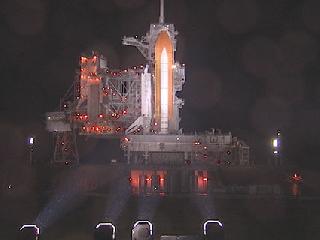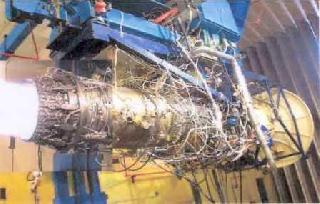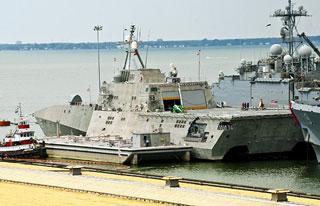
Space shuttle Discovery stands on Launch Pad 39A at NASA's Kennedy Space Center in Florida on Thursday morning. Photo: NASA TV
CAPE CANAVERAL, FLORIDA (AP): Storms prevented Discovery from blasting off on its final journey Thursday, the latest in a series of postponements for NASA's oldest and most travelled space shuttle.
Just before daybreak, mission managers called off the afternoon liftoff and said they would try again Friday.
Rain was pounding the area, and meteorologists said there was little chance the weather would break in time for Thursday's planned launch. The official forecast was 80 percent "no go."
"As crazy luck would have it," the area's month long drought ended Thursday, said Pete Nickolenko, assistant launch director.
"If it looked like there was any possible chance of giving it a shot, then I think we would have," he said. "It was really very clear today that it just wasn't looking to be our day weather-wise," Nickolenko said.
Friday, the weather outlook improves. There is a 60 per cent chance that conditions will be acceptable for launch once the cold front passes through, although wind will be a concern.
Managers will meet again early Friday to evaluate the weather. If they feel they have a decent shot, they will give the go-ahead to fuel Discovery for liftoff. Liftoff Friday would be at 3:04 p m (1904 GMT).
Discovery already has been delayed by gas leaks and an electrical problem.
The mission to the International Space Station is now running four days late. It will be the final flight for Discovery, which faces a museum retirement as the shuttle program winds down.
Six veteran astronauts are assigned to the 11-day flight. They have been at Kennedy Space Center for the past week, waiting out all the delays.
NASA has until Sunday to launch Discovery, otherwise the shuttle will remain grounded until the beginning of December because of unacceptable solar angles.
It's officially NASA's next-to-last shuttle flight.
Endeavour is scheduled to lift off at the end of February. An extra mission may be added in mid-2011, if money is forthcoming.
The White House wants NASA focused on next-generation rockets and spacecraft that could carry astronauts to asteroids and Mars.
The plan, for now, also calls for private business to develop rockets capable of carrying astronauts to the space station. Until then, American space travellers will need to hitch rides on Russian Soyuz vessels.
 Previous Article
Previous Article Next Article
Next Article












The Indian Air Force, in its flight trials evaluation report submitted before the Defence Ministry l..
view articleAn insight into the Medium Multi-Role Combat Aircraft competition...
view articleSky enthusiasts can now spot the International Space Station (ISS) commanded by Indian-American astr..
view article